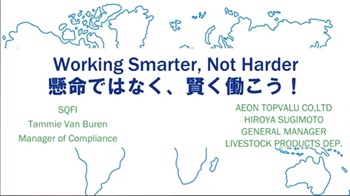Working Smarter, Not Harder: Using Data to Build Continuous Improvement
By Tammie Van Buren, Manager, Compliance, SQFI

In an effort to share how to learn to transform data into something that can drive informed decisions for problem resolution and continuous improvement, I recently presented at SQF Global with Mr. Hiroya Sugimoto of AEON TopValu.
The session began with my sharing the following quote:
“Most of the world will make decisions by either guessing or using their gut. They will be either lucky or wrong.”
Suhail Doshi, Chief Executive Officer, Mixpanel
The quote to me sums up the answer to the question: “Why do we need to use data to make decisions?” You hear management teams talk about how good they are because their KPIs or key performance indicators are in the green each month or improved over last year’s information. They may measure themselves on the number of recalls, or the number of quality holds, the number of customer or consumer complaints. There are any number of indicators used. But just because you are in the green or improved over a year ago doesn’t mean that you are good. You may just be lucky. For those of you who are Clint Eastwood/Dirty Harry fans, maybe the real question to ask is: “Do you feel lucky?”
Mr. Sugimoto and I dove into some useful ways to utilize data that will take out the guessing or relying on gut feelings. We looked at two key principles: understanding your data and transforming it into something useful. We then summed up the session by showing how AEON TopValu uses SQFI data in their compliance management program.
Through practical demonstrations on how to evaluate when data has been used in the past and is currently being used, we can peer into the future of SQF data analysis. By sharing the top nonconformances as examples, we illustrated how using simple tools to help you better understand your data can improve your food safety and quality systems.
If you missed the session, the recording is available on the SQF Global platform for attendees until November 30, 2020. If you were not in attendance at SQF Global, you can obtain a November All Access Pass.
Recent Blog Posts
SQF Code Edition 10 represents a critical step forward in ensuring rigorous yet practical food safety management across the supply chain.
In an industry where compliance and operational integrity are nonnegotiable, manufacturers and suppliers need more than just certification — they need a globally recognized solution.
Renee McVey is one of the first industry professionals to hold the Safe Quality Food Institute’s new Certified SQF Practitioner credential, which is administered by Exemplar Global.




